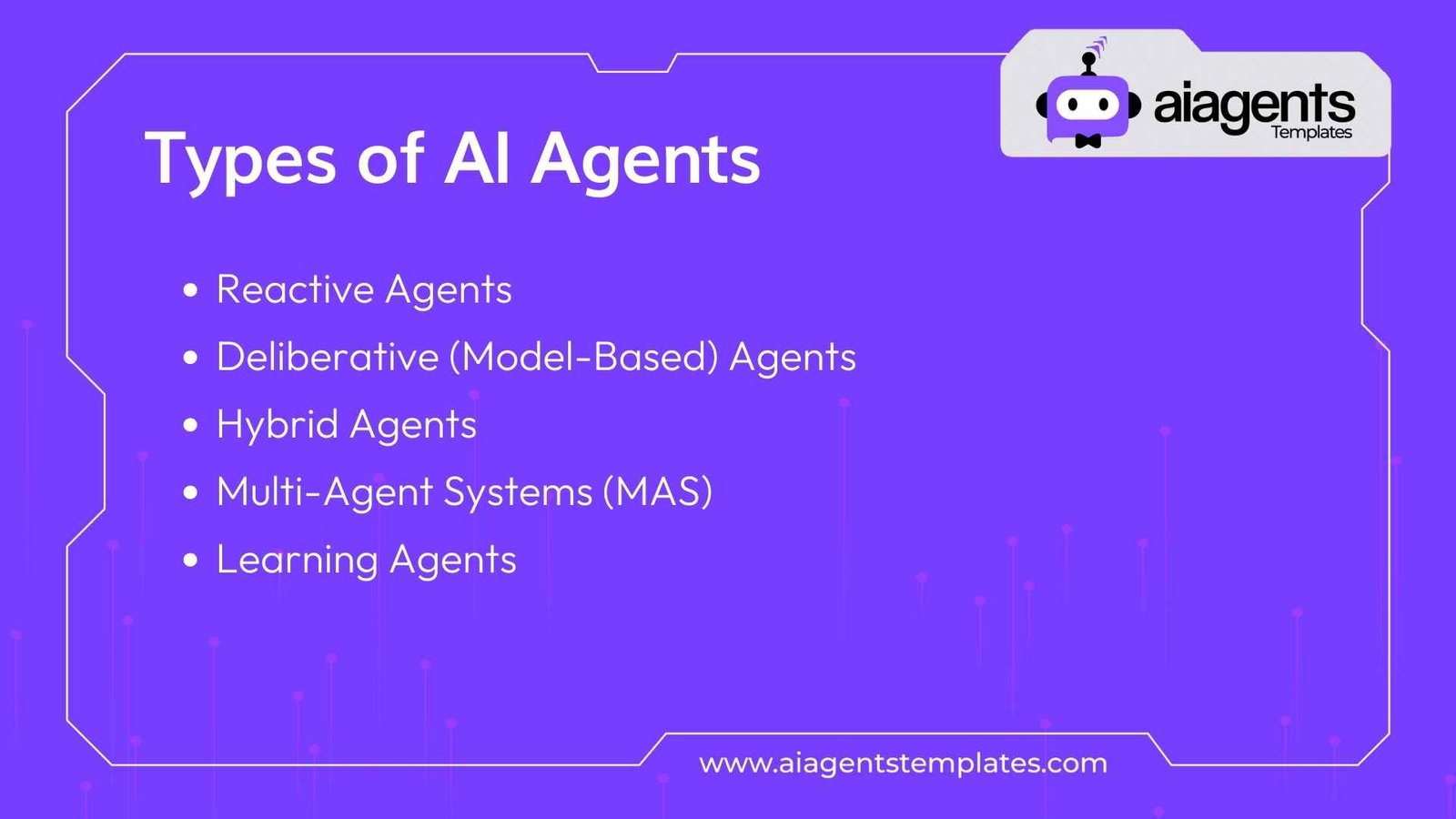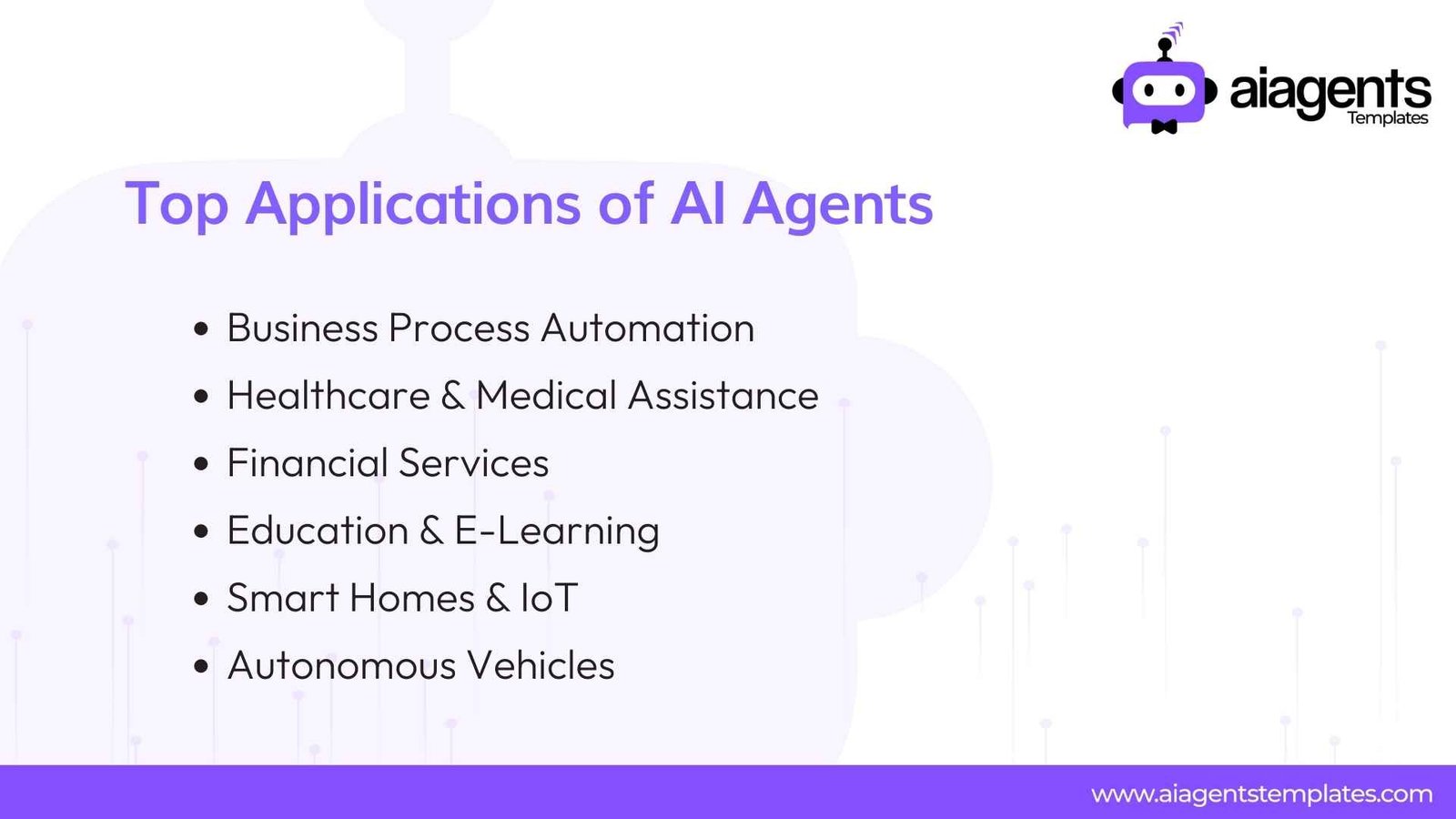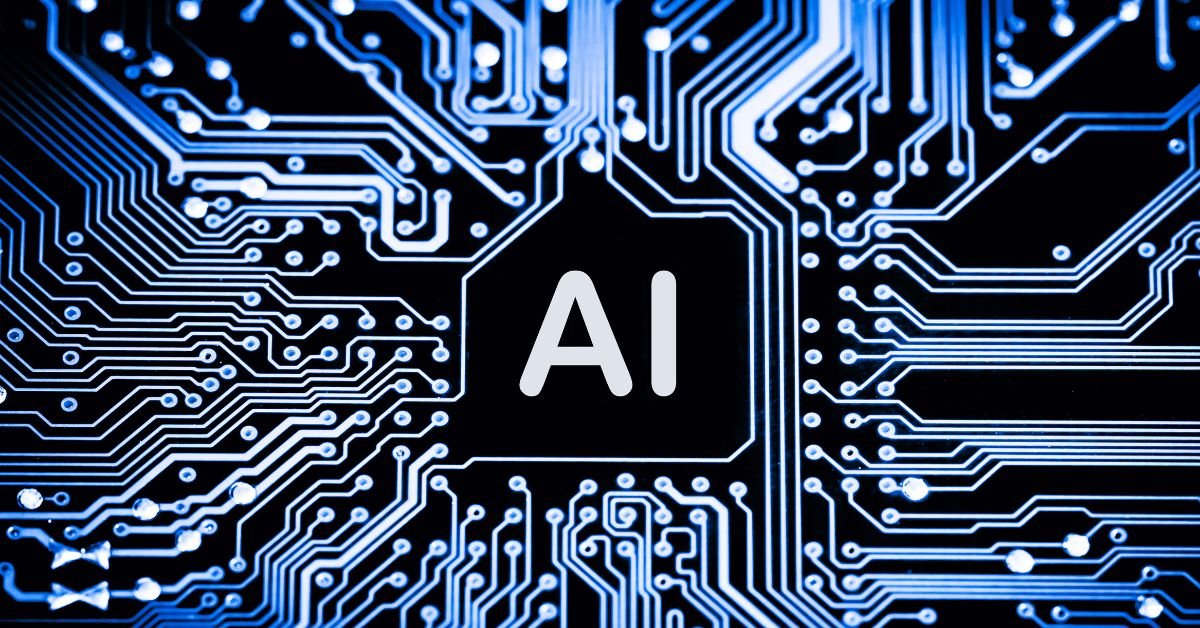AI agents are transforming several industries by automating workflows, enhancing decision-making, and streamlining complex tasks. As we enter 2025, AI agents have become more intelligent, adaptive, and capable of handling real-world scenarios across multiple domains. This guide explores their applications, latest features, top tools, and future trends, providing valuable insights for businesses and individuals looking to leverage AI for growth.
"2025 is the year of AI agents."
Jensen Huang, CEO of Nvidia
Why AI Agents Matter in 2025
The AI market is booming. According to Statista, the global AI market is expected to reach $826 billion by 2030. AI agents are at the core of this revolution, driving efficiency, innovation, and automation across industries.
"AI agents will become an integral part of our daily lives, helping us with everything from scheduling appointments to managing our finances. They will make our lives more convenient and efficient."
Andrew Ng, Co-founder of Google Brain and Coursera
Key Takeaways
- Understand how AI agents are evolving.
- Learn about their key applications in different sectors.
- Discover the latest tools and platforms in AI development.
- Explore future trends and how they will shape the world
What Are AI Agents?
AI agents are software programs that use artificial intelligence to understand their environment, process information, and take actions to achieve specific goals. These agents use advanced algorithms, including machine learning, natural language processing (NLP), and reinforcement learning, to improve their efficiency and adaptability.
- Did you know?
AI-powered automation can increase workplace productivity by 40% (McKinsey & Company).
Core Concepts of AI Agents
1. Perception
Perception is the process by which AI agents gather, interpret, and analyze data from their surroundings. It enables them to understand the environment and react accordingly.
How AI Agents Perceive the World:
- Sensors and IoT Devices: AI agents rely on sensors such as cameras, microphones, LIDAR, and biometric scanners to collect raw data.
- Natural Language Processing (NLP): Enables AI agents to process spoken and written language, understand context, and generate human-like responses (e.g., ChatGPT, DeepSeek).
- Computer Vision: Allows AI to recognize faces, objects, and gestures in images and videos (e.g., self-driving cars identifying pedestrians).
- Anomaly Detection: AI agents use statistical models to identify unusual patterns in data (e.g., fraud detection in banking transactions).
Example: In healthcare, AI-powered diagnostic tools use computer vision to analyze MRI scans and detect anomalies faster than human doctors.
2. Decision-Making
Decision-making refers to an AI agent’s ability to analyze data, evaluate possible actions, and determine the best course of action.
How AI Agents Make Decisions:
- Rule-Based Systems: Agents follow predefined logic (e.g., chatbots using if-then rules).
- Machine Learning Models: AI learns from past experiences, identifying patterns and making predictions (e.g., recommendation systems like Netflix).
- Reinforcement Learning: AI agents self-learn by taking actions in an environment, receiving rewards or penalties to improve over time (e.g., DeepMind’s AlphaGo).
- Context-Awareness: AI factors in external conditions before making a decision (e.g., self-driving cars analyzing weather, road conditions, and traffic).
Example: AI-powered trading bots analyze market trends, predict price movements, and execute trades in milliseconds, outperforming human investors.
3. Action Execution
After making a decision, AI agents execute actions to achieve their goals. These actions can be physical (e.g., robot movements) or digital (e.g., sending automated alerts).
How AI Agents Take Action:
- Robotic Process Automation (RPA): Automates repetitive digital tasks in industries like finance and customer service (e.g., AI chatbots handling FAQs).
- Autonomous Robotics: AI-powered robots perform complex operations such as warehouse logistics (e.g., Amazon’s Kiva robots) or surgery (e.g., Da Vinci surgical robots).
- Conversational AI: Virtual assistants like Alexa and Google Assistant execute commands, set reminders, and provide real-time information.
- Predictive Automation: AI agents take proactive measures based on insights (e.g., AI cybersecurity systems preventing potential attacks).
Example: Tesla’s AI-driven Autopilot system continuously collects data from surroundings, processes it in real-time, and executes driving actions like lane changes and braking.
4. Environment Interaction
For AI agents to function effectively, they must adapt to changing conditions in real-world environments.
How AI Agents Interact with the Environment:
- Continuous Learning: AI models constantly update themselves based on new data and feedback (e.g., AI customer support improving responses based on user interactions).
- Multi-Agent Collaboration: AI agents work together to complete tasks (e.g., swarm robotics in agriculture using multiple drones to monitor crops).
- Human-AI Interaction: AI augments human decision-making by offering recommendations or handling repetitive tasks (e.g., AI-assisted writing tools like Grammarly).
- Situational Awareness: AI dynamically adjusts its behavior in response to unexpected changes (e.g., AI traffic management rerouting vehicles in case of accidents).
Example: AI-powered disaster response drones detect survivors in disaster zones, adapting their search patterns based on environmental changes.
Types of AI Agents

AI agents can be categorized into different types based on their complexity, functionality, and ability to learn from their environment.
1. Reactive Agents
- These agents operate solely based on the current input and do not store past experiences or adapt over time.
- They function on predefined rules and respond to stimuli in real-time.
- Example: AI-powered chatbots that provide fixed responses based on keywords or commands.
- Use Case: Automated customer support systems that offer instant responses without learning from previous interactions.
- Limitations: Cannot learn from past interactions, making them less efficient for complex decision-making.
2. Deliberative (Model-Based) Agents
- These agents construct an internal model of their environment and use logical reasoning to make informed decisions.
- They can plan multiple steps ahead to achieve goals rather than reacting immediately to inputs.
- Example: AI-powered personal assistants like Google Assistant or Apple’s Siri, which analyze user intent and context before responding.
- Use Case: AI in supply chain management, where agents predict future demand and optimize logistics based on market trends.
- Benefits: More sophisticated and capable of handling multi-step problem-solving.
3. Hybrid Agents
- These agents combine features of both reactive and deliberative agents, making them versatile and efficient.
- They use memory and reasoning while still being capable of reacting quickly to changing situations.
- Example: Autonomous driving AI in Tesla’s Full Self-Driving (FSD) mode, which reacts to immediate hazards while planning routes based on long-term objectives.
- Use Case: AI-driven health monitoring systems, where agents assess real-time patient data while considering historical medical records.
- Strengths: Balances efficiency and adaptability, making them ideal for real-time dynamic environments.
4. Multi-Agent Systems (MAS)
- A network of AI agents that work collaboratively to solve complex problems.
- These agents communicate and share knowledge, improving decision-making in distributed environments.
- Example: AI-powered swarm robotics used in search-and-rescue missions, where multiple drones coordinate to locate survivors.
- Use Case: AI-driven smart city infrastructure, where multiple AI agents manage energy distribution, traffic flow, and public safety.
- Benefits: Enhances efficiency in distributed environments by leveraging multiple AI systems for optimized decision-making.
5. Learning Agents
- These agents improve over time by learning from past experiences using machine learning algorithms.
- They adapt and optimize their decision-making based on feedback from interactions.
- Example: AI-powered recommendation systems like Netflix and Spotify, which refine suggestions based on user preferences.
- Use Case: AI in cybersecurity, where agents continuously learn and detect new security threats based on evolving attack patterns.
- Capabilities: Can generalize knowledge across multiple domains, making them highly efficient for dynamic applications.
Latest Advancements in AI Agents (2025)
AI will become an expected, obvious part of every product and service, just like mobile integration became a necessity.
- Sam Altman, CEO of OpenAI
AI technology is evolving rapidly, with breakthroughs improving the capabilities of AI agents. Here are some of the most significant advancements:
1. Autonomous Decision-Making
AI agents can now process massive datasets and autonomously make complex decisions in real-time, reducing human intervention. This is especially beneficial for industries like finance, healthcare, and cybersecurity.
2. Context-Aware AI Agents
3. Adaptive Learning Mechanisms
4. Integration with IoT and Edge Computing
5. AI Agents for Cybersecurity
With the rise of cyber threats, AI-driven security agents proactively detect and mitigate risks, making them indispensable in enterprise environments.
Google Trends Insight: Searches for “AI agents in cybersecurity” have increased by 70% in the past year—a clear indication of growing interest in this field.
Top Applications of AI Agents in 2025

AI agents are revolutionizing diverse industries by enhancing automation, improving security, and optimizing efficiency. Below are some of the top applications:
1. Business Process Automation
- AI-driven automation reduces manual tasks, increases efficiency, and lowers operational costs.
- Companies like UiPath and Blue Prism leverage AI agents for workflow automation.
2. Healthcare & Medical Assistance
- AI-driven virtual assistants help diagnose conditions and recommend treatments.
- AI-powered robotics assist in complex surgeries, reducing errors.
- Example: IBM’s Watson Health is advancing AI-driven healthcare solutions.
3. Financial Services
- AI agents analyze market trends, detect fraudulent activities, and provide investment recommendations.
- Example: JPMorgan Chase uses AI for fraud detection and personalized financial planning.
- Stat: AI in fintech is projected to be worth $26.67 billion by 2025 (PwC).
4. Education & E-Learning
- AI tutors personalize learning experiences and offer real-time feedback.
- Platforms like Khan Academy and Coursera integrate AI for adaptive learning.
5. Smart Homes & IoT
- AI-powered smart assistants like Google Assistant, Alexa, and Siri enhance daily life.
- Smart security systems use AI for real-time threat detection.
6. Autonomous Vehicles
- AI agents improve self-driving capabilities in cars.
- Tesla’s AI-based autopilot system reduces accident rates.
Industry Growth: The self-driving car industry is expected to reach $60 billion by 2030.
AI Agents: Ethical Considerations & Challenges
As AI agents become more integrated into daily life, ethical concerns and challenges must be addressed to ensure responsible AI development.
1. AI Bias and Fairness
- AI systems can inherit biases from training data, leading to discriminatory outcomes.
- Ethical AI frameworks, like those from IBM and OpenAI, are working towards fair AI models.
2. Privacy & Data Security
- AI-powered surveillance raises concerns about data privacy.
- Stricter regulations like GDPR and AI Ethics Guidelines ensure responsible data handling.
3. Job Displacement
- Automation by AI agents may replace certain jobs while creating new opportunities.
- Workforce reskilling programs are being promoted by tech giants like Microsoft and Google.
AI Agents: Industry Adoption & Real-World Use Cases
1. AI in Retail & E-Commerce
- Personalized Shopping Experiences: AI-driven recommendation engines increase conversions by 35% (Forrester Research).
- Inventory Management: AI agents predict demand fluctuations, minimizing overstock and shortages.
2. AI in Human Resources & Recruitment
- Automated Resume Screening: AI-powered ATS (Applicant Tracking Systems) reduce hiring time by 50%.
- AI Interview Assistants: Platforms like HireVue use AI agents to assess candidates via video interviews.
3. AI in Healthcare Research & Drug Discovery
- Accelerating Drug Development: AI shortens the drug discovery timeline by up to 70% (Harvard Medical School).
- Predictive Diagnostics: AI detects diseases like cancer at an 85% accuracy rate.
4. AI Agents in Legal & Compliance
- AI agents assist in contract analysis, legal research, and regulatory compliance checks.
Example: ROSS Intelligence uses NLP to process legal documents 80% faster.
5. AI in Marketing & Advertising
- AI-driven Ad Targeting: AI optimizes ad placements, improving ROI by 30%.
- Chatbots for Customer Support: AI agents handle 80% of customer queries without human intervention.
Future Trends: What’s Next for AI Agents?
AI agents are expected to evolve further with groundbreaking innovations shaping the next decade.
1. AI Agents with Emotional Intelligence
- AI systems are learning to detect and respond to human emotions, making interactions more natural.
- Example: Companies like Affectiva and Amazon’s Alexa AI are developing emotionally aware AI.
2. AI for Sustainability & Green Tech
- AI agents optimize energy use, reduce waste, and enhance environmental monitoring.
Stat: AI-driven climate monitoring systems improve accuracy by 40%.
3. AI in Space Exploration
- NASA is deploying AI agents for autonomous navigation on Mars and beyond.
- Example: AI-powered rovers process data and make real-time decisions on planetary surfaces.
Ethical AI & Governance: Addressing the Risks
As AI agents become more widespread, ethical concerns and regulatory challenges must be addressed to ensure responsible development.
1. Ethical AI Development
- AI systems must be designed to avoid bias and discrimination.
- Companies like Google AI and IBM Watson are investing in fairness-aware AI models.
2. AI Governance & Regulations
- Governments worldwide are introducing AI regulations, such as the EU AI Act and US AI Bill of Rights.
- Example: The OECD AI Principles focus on transparency, fairness, and accountability in AI systems.
3. The Role of AI Explainability
- AI explainability helps users understand how AI decisions are made.
- Explainable AI (XAI) ensures that AI decisions are interpretable and reliable.
AI Agents & Human Collaboration: The Road Ahead
1. AI as a Complement to Human Intelligence
- AI agents are designed to assist, not replace, human workers.
- Example: AI-driven co-pilots in coding, such as GitHub Copilot, enhance developer productivity.
2. The Future of Work with AI Agents
- AI automates repetitive tasks, allowing humans to focus on strategic decision-making.
- Stat: 72% of businesses see AI as a tool to enhance human work rather than replace it (MIT Sloan).
3. AI & Creativity: A New Frontier
- AI is increasingly used in creative fields, such as music composition, graphic design, and content writing.
- Example: AI-generated art platforms like DALL·E 3 push the boundaries of creativity.
Conclusion
AI agents are no longer a futuristic concept—they are an integral part of modern industries. With continuous advancements, AI agents will further enhance business automation, customer experience, and global productivity.
However, ethical considerations, governance, and human collaboration must be prioritized to ensure responsible AI development. As we move forward, companies and individuals must adapt to AI’s transformative power while fostering transparency and trust in AI-driven solutions.
Final Thought: The future of AI agents is not about replacing humans, but empowering them to achieve more. By leveraging AI responsibly, we can create a future where AI agents and human intelligence work in harmony to build a smarter, more efficient world.
“We will soon see one-person Billion dollar companies”
- Sam Altman, CEO of OpenAI


